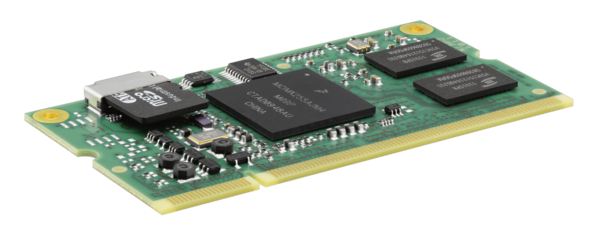DHCOM iMX25-D2: Difference between revisions
From Wiki-DB
Jump to navigationJump to search
| Line 12: | Line 12: | ||
{| class="wikitable" | style="width: 100%; color: #000000; background: #f3f3f3;" valign="top" | | {| class="wikitable" | style="width: 100%; color: #000000; background: #f3f3f3;" valign="top" | | ||
|- | |- | ||
| style="width: 50%; background: #076b8d;" | | | style="width: 50%; background: #076b8d; border: 0pt;" | | ||
| style="width: 50%; background: #076b8d;" | | | style="width: 50%; background: #076b8d; border: 0pt;" | | ||
|- | |- | ||
|valign="top"| | |valign="top" style="border: 0pt;" | | ||
* Freescale ARM9 i.MX25 @ 400 MHz | * Freescale ARM9 i.MX25 @ 400 MHz | ||
* 0 - 2048 MB NAND-FLASH | * 0 - 2048 MB NAND-FLASH | ||
| Line 23: | Line 23: | ||
* LC-Displaycontroller, 16 Bit colour depth, 800 x 600 Pixel | * LC-Displaycontroller, 16 Bit colour depth, 800 x 600 Pixel | ||
* Touchcontroller onboard, 4-wire resistive | * Touchcontroller onboard, 4-wire resistive | ||
|valign="top"| | |valign="top" style="border: 0pt;" | | ||
* Ethernet 10/100 MBit | * Ethernet 10/100 MBit | ||
* 1x USB Host full-speed, USB OTG high-speed | * 1x USB Host full-speed, USB OTG high-speed | ||
Revision as of 08:50, 4 August 2015

|
Hardware
|
|
Software Support
Downloads
Bootloader Binary
- Download U-Boot binary (v1.18.0.5) (for updating, please have a look at FAQ list)
Settings Files
- Settings PrimeView 7" Display (PM070WT3) (for U-Boot Version v1.11.2.0 or higher)
- Settings DataImage 4,3" Display (FG040360DSSWBG03) (for U-Boot Version v1.11.2.0 or higher)
DHupdate.ini example
Update Bitmap example files
Splash Image examples
Root Filesystem Update Kernel
Linux Kernel Binary and Sources
- Linux Kernel based on 3.2.9 mainline available on GitHub
- Current built of the 3.2.9 DHCOM iMX25 linux kernel (2013-09-20)
Virtual Machine for Application Development
- Debian Squeeze VMware Image (PW: dhelectronics)
Password for devel user: devel
Password for root user: root